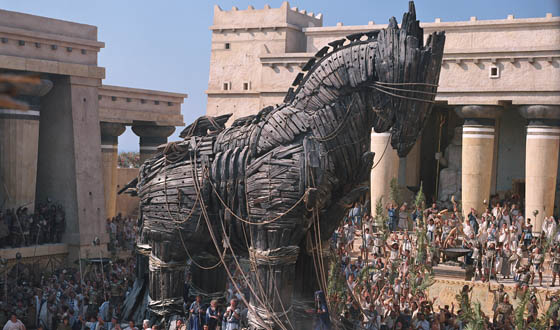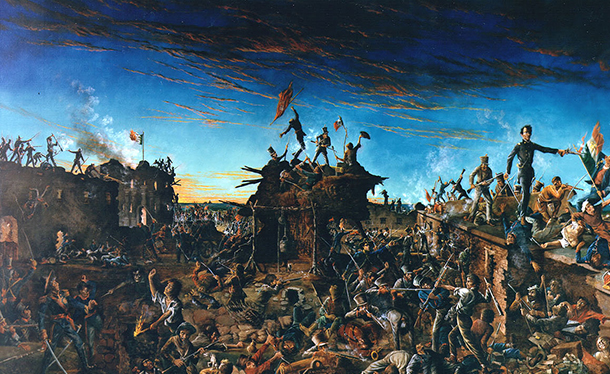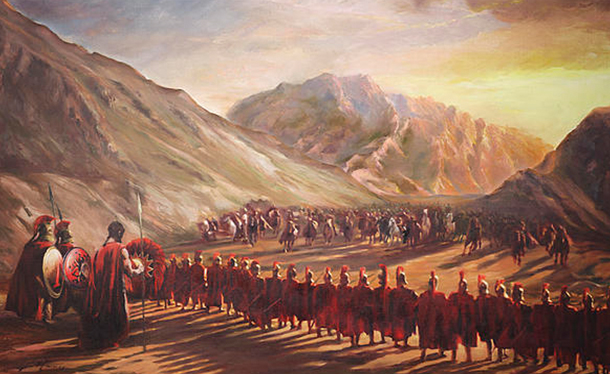
THE EPIC (fail) OF TROY!
September 17, 2012
THE ALAMO
September 18, 2012*Note: This article was originally written in 2012.
CONTENT WARNING: this article contains mild language, crude humor, and Spartans!
The Greco-Persian Wars 499–449 BCE The Battle of Thermopylae 480 BCE
King Leonidas 540-480 BCE / Xerxes 519 – 465 BCE

A very long time ago, a good 2.5 thousand years ago in fact, before the Bible was a best-seller, before the Bible was published for that matter, yes even before the creation of Facebook, in the cluster of islands that made up Ancient Greece (and most of the ancient world for Western Civilization), there lived a quaint little village known as SPARTA!!!
Once upon a time, in Greek town of Sparta, there lived a King by the name of Leonidas. And so it is said that in the land of Thermopylae, Leonidas and 300 Spartans would forever change the course of history by defying the Great King Xerxes of the Persian Empire. But what led to this, what exactly went down, and why do we care? If there’s one thing historians can agree on, it’s that the world would be a very different place if things had gone differently….
THE SPARTANS  The City-State of Sparta was the home to the legendary warriors known as, you guessed it, Spartans! (not to be confused with the cybernetically-enhanced super-soldiers from the UNSC’s Naval branch who were instrumental in the interstellar war against the Covenant in the year 2553 – see ‘Halo’ franchise)
The City-State of Sparta was the home to the legendary warriors known as, you guessed it, Spartans! (not to be confused with the cybernetically-enhanced super-soldiers from the UNSC’s Naval branch who were instrumental in the interstellar war against the Covenant in the year 2553 – see ‘Halo’ franchise)
 The proud Spartans (aka Lacedaemonians) were the finest soldiers of their time. These ripped badasses trained as young men and were more than willing to fight to the death in the name of their country. The Spartans pioneered modern military tactics, were bad to the bone, and wore very little armor except for a spear and shield combo which were instrumental in the formation of their phalanx strategy. The phalanx was a move where they formed an impenetrable line of pointy-staby-things with their bronze shields locked
The proud Spartans (aka Lacedaemonians) were the finest soldiers of their time. These ripped badasses trained as young men and were more than willing to fight to the death in the name of their country. The Spartans pioneered modern military tactics, were bad to the bone, and wore very little armor except for a spear and shield combo which were instrumental in the formation of their phalanx strategy. The phalanx was a move where they formed an impenetrable line of pointy-staby-things with their bronze shields locked  together for cover, it proved to be extremely efficient against their adversaries.
together for cover, it proved to be extremely efficient against their adversaries.
Seriously, the Spartans were not to be messed with. I would rather fight a pack of rabid Grizzly bears than a single Spartan warrior! Heck, a lowly Spartan bronze-armor-shiner! I’d pit a Spartan up against any manner of soldier, and they’d come out on top, I’m talkin’ mobsters, ninjas, robots, you name it! Suffice it to say that you’d be smart to avoid getting into a bar fight with one of these dudes.

Chuck Norris was here.
Life in Sparta revolved around warfare, not unlike Viking culture. The difference perhaps is that Vikings had a culture, Spartans on the other hand would rather violently die in battle than enjoy music, art, or philosophical debate. They simply had no need for the finer things in life.
They were highly xenophobic (feared those who were different), and were very dedicated to their own interpretations of freedom, which of course was only reserved for them, seeing as they captured and owned slaves (not so different from the Founding Fathers in that regard). They were however ahead of their times in the department of women’s rights. Evidence suggests that Spartan women were seen as equals, which flabbergasted their fellow Greeks above all else.
They were a military-based culture, which was governed by a council of wise old veterans. At a young age, Spartan boys were trained to be tougher than concrete, forced to beat each other senseless till they were full-blown killing-machines, and then tested in the wild during a grueling coming of age regiment known as the Agoge trials. The Agoge rituals enforced the importance of the State above one’s own well-being. This rigorous system was first introduced during the 7th Century BCE and is often attributed to a somewhat mythical law-giver by the name of Lycurgus. 
According to mythology they were descended from the bloodline of Hercules (Heracles) himself, and supposedly the Ten Year Trojan War was waged after they were provoked when the Queen of Sparta (Helen of Troy) was allegedly kidnapped by the opposing team (guess how that went down for the Trojans?). But there’s one particular historical event that cemented their lore more than any other, it was at The Battle of Thermopylae were the Spartans truly went left their permanent mark on history. Funny thing is, their proudest moment was a battle that they technically lost…
However, just because the Spartans lost the battle, doesn’t mean they ultimately failed… The Battle of Thermopylae is now one of the most famous moments in history partially thanks to a certain motion picture (directed by Zack Snyder, starring Gerard Butler). “300” was a visually metaphorical CGI-fest based on a graphic novel by Frank Miller which was also based on Herodotus’s chronicles in ‘The Histories’, which believe it or not, just so happened to be (loosely) based on actual true events. As awesome as that movie is, it’s not exactly a documentary. Whereas parts of it are taken directly from Herodotus’s (somewhat questionable) accounts, most of its just a badass, somewhat inaccurate, reenactment chock full of slow motion symbolism, and more pints of blood than a Mortal Kombat tournament.

Fatality… or Brutality?
This epic conflict at Thermopylae took place during the midst of the Greco-Persian Wars which waged for nearly 50 years. Most of what we know about this period and its related events comes from both Herodotus and Plutarch. Before we delve into the specifics of this particularly bloody battle, to fully understand this battle and its significance we have to first rewind a little bit…
THE PERSIAN EMPIRE
Unfortunately, the Persian Empire is often demonized by American pop-culture, but the truth of the matter is that they made numerous contributions to civilized culture in the way of art, architecture, transportation, language, and economics. The Persians were the first multinational empire, the first to use coin currency, and were also the first in history to give both men and women equal rights, abolish slavery, and wrote the first bill of human (and animal) rights! They were based out of the Middle East, with its center in modern-day Iran. The original Persians were actually Aryans, like the Germans that migrated from Southern Russia. Their eventual collapse came about when the Islamic Arabs seized control in the 7th Century CE.
Like all empires to follow, the Persians spread their way of life by the sword, without mercy. 
The Persian Empire was first founded in the 6th Century BC by Cyrus the Great, the Zoroastrian ruler who conquered much of West Asia, including the former Babylonian Empire in Mesopotamia. The Persian monarchy, like those that followed in its footsteps, was fueled by the belief that Cyrus and his sons were chosen by God to rule over all of mankind.
Enter: Darius the First (550–486 BCE), the third King of the Achaemenid line, and heir to the Persian Empire. Darius ruled the lands of Persia at its height, and sought to expand its borders to the ends of the earth. He was one of the first to take on the moniker ‘King of Kings’ (right behind Ramses II of Egypt).
In his conquest, Darius set his sights on the small city-states of Greece. The Greeks of the Hellenic world were a rambunctious bunch who were notorious for fighting among one another. Darius assumed their Hoplite warriors would be no match for his enormous legions. The citizen-soldiers of Greece’s Peloponnese peninsula would prove to be anything but pushovers.

Darius I
It all started with the Ionian Revolts against Persian rule. Darius eventually managed to crush the rebels before moving on to the rest of Greece, with a cemented determination to burn down Athens in retaliation for the fall of Sardis. In 490 BCE, the Athenians met the Persian Invasion force at Marathon where they were joined by their Plataean allies.
However, when the call came for Spartan reinforcements, they did not answer, which was very un-Spartan-like. You would think they would jump at the chance to don their armor and show the Athenians how it’s done, but as it turns out the Spartans were too busy partying. You see, Spartan law was very strict when it came to the honoring of their festivals (and getting wasted in the name of Dionysus).
Regardless of the absent (and most likely inebriated) Spartans, the Greeks somehow managed to hold their own against the Persian forces, and unexpectedly pulverized them. Legend states that a messenger ran from Marathon to Sparta to ask for assistance (a measly 140 miles). Following the battle this same messenger sprinted to Athens to announce their victory, and promptly died on the spot.
Following news of the Persian’s embarrassing defeat, Darius began plans to strike back, but died instead. So Darius’s son, Xerxes took up the throne, and swore to avenge his father’s failure…
XERXES
King Xerxes I is also known as Ahasuerus from the Biblical story of Esther. The book of Esther recounts the story of a beautiful (yet impoverished) Jewish girl, Hadassah, who miraculously became Xerxes’s Queen, after he divorced his last wife for not stripping for his friends or something? Esther / Hadassah was chosen above all others, competing against not only his extensive harem, but thousands of young virgins from across the far reaches of the empire. From her newly appointed position of power, Esther was able to save the Hebrews from annihilation. Meanwhile, Esther’s hubby, Xerxes, had another group of people in mind for extermination: the Hellenic insurgents who refused to bow down before his might.

The Historical Xerxes
Xerxes’s first act as king was to brutally put down the uprisings in both Babylon and Egypt. He then made plans to conquer all of Greece in a single campaign. Xerxes assembled a gargantuan army and navy consisting of Assyrians, Phoenicians, Indians, Egyptians, Jews, Babylonians and Arabs, in excess of 360,000 soldiers, including 10,000 elite ‘Immortals’ and 700 ships!
Xerxes himself led the initial invasion. They were immediately met by a series of bad omens in the form of weather anomalies. A storm in the Aegean Sea destroyed a third of their fleet. When they came across a straight known as the Hellespont the Persian’s initial attempt to bridge it failed miserably when another freak storm swept through and ripped their puny bridge to shreds. In a fit of rage Xerxes ordered his men to whip the Hellespont (as in the body of water itself) into shape, with actual whips. After scratching their heads in confusion, and shrugging their shoulders the soldiers complied, because he said so. The first few Greek cities bowed before his mighty forces, but then a messenger came to Sparta…
KING LEONIDAS

The epitome of heroism personified.
His name is synonymous with valor, strength, and badassitude. Leonidas means ‘Son of the Lion’. This legendary leader was one of King Anaxandridas’s sons, and took on the title of King after his half brother Cleomenes went insane and fled town when news of the Persian invasion at Marathon reached their doorstep. King Leonidas later married Cleomenes daughter, Gorgo.
 In the pages of ‘Sayings of Spartan Women’, Plutarch relates a story of Queen Gorgo: when she was once asked why Spartan women were able to rule over their men, her reply was, “Because we are also the only ones who give birth to (real) Men.”
In the pages of ‘Sayings of Spartan Women’, Plutarch relates a story of Queen Gorgo: when she was once asked why Spartan women were able to rule over their men, her reply was, “Because we are also the only ones who give birth to (real) Men.”
One day, when a messenger came to Sparta requesting Earth and Water as a gesture of obedience to the Great King Xerxes, the unfazed Spartans laughed in his face, and basically told him to go do something… with himself. (They may or may not have kicked him down a well in slow motion, the historical accuracy of that is a little fuzzy.) As you can imagine, this little act of defiance really pissed Xerxes off, and so “the Great and Powerful” Xerxes reciprocated: with an incredible invasion force upwards of Sixty-Thousand troops!
Rather than show fear in the face of inevitable destruction, in response Leonidas essentially told Xerxes to ‘bring it’. Leonidas knew upfront that this would be a fight they would not return home from, but something compelled him to fight to the death in the name of defiance. He hand selected *300* of his men who all had sons to carry on their name, and marched towards Thermopylae.
Before leaving home, this is the final exchange recorded between Leonidas and his wife, Gorgo:
She asks her husband what she
should do when he’s gone, he says, “Marry a good man, and bear good children.”
Before he departs, she tells him, “Come back with your shield, or on it.”
It might have been a suicide mission, but it would not be in vain…
THE GATES OF HELL!

Thermopylae, or the ‘Hot Gates’ was a mountain passageway that the Persians would have to march through to get to the rest of Greece. The Greek alliance devised a plan to mount a defense and block it off in order to slow the Persians down long enough to prepare for a full-scale war on the home front. A truth that’s often overlooked is the fact that the hopelessly outnumbered Spartans were not alone in this fight, the Greek armies that joined the 300 Spartans actually included a force of 4,300 under Leonidas’s command; Greek Helots and Hoplite soldiers from: Thespiae, Thebes, Euboea, Phokis, and Athens.
So really, the movie should’ve been called 4,300, but whose counting?
Other than superior numbers, the Persians also brought with them a game changer, a revolutionary weapons technology that would alter the ways of war: the Bow and Arrow! The Greeks were, it would seem, screwed. When a Persian scout boasted that their archers’ arrows would blot out the sun, Dieneces, one of the brave 300, responded with a nonchalant smile, “So much the better – we shall fight them in the shade!”

“I did not mean that LITERALLY!!!”
“Deliver up your arms,” Xerxes demanded of the Spartan King.
Leonidas spat back, “Come and take them!”
For three days, the 300 Spartans, backed by their Greek brothers, fought tooth and nail against wave after wave of a seemingly invincible enemy. They could smell the futility in the air mixed with the aroma from the blood of their fallen comrades and still they fought to their last breathe. Like the Texans at The Alamo, they gave their lives in the service of independence.
On the third day of fighting, Leonidas allegedly told his men, “Have a good breakfast men, for we dine in Hades!”
 Think of it like the Battle of Helm’s Deep (from “Lord of the Rings: The Two Towers”), minus Gandalf the White riding in to save the day at the last possible minute, of course…
Think of it like the Battle of Helm’s Deep (from “Lord of the Rings: The Two Towers”), minus Gandalf the White riding in to save the day at the last possible minute, of course…
For all we know, the Greeks may have won that day, if it wasn’t for a traitor within their own ranks. A defecting jerk by the name of Ephialtes of Trachis, made a deal with the Persians, and in return showed them a path around their fortified position around the pass. The Spartan-led allies were bottle-necked in the Hot Gates and their fate was sealed by a swarm of Persian hordes from both sides…
Leonidas died valiantly, leading his men against a legion of enemies. When their King fell, the remaining soldiers formed a phalanx around their fallen leader, defending his body with their own, until the last of them fell to his knees and joined the rest of his 299 compatriots in the afterlife.
Xerxes, like a coward proving a point to himself, had the body of Leonidas mutilated and his head stuck on a pike.
AFTERMATH
“Go tell the Spartans, stranger passing by, That here, obedient to their laws, we lie.”

Sometimes, success is a relative thing. For instance, if the goal was to stop the Persians in their tracks, the Spartans definitely failed miserably (not that they didn’t give it a worthy attempt), but if the goal was in fact to cut down as many as they could in an attempt to delay the Persians (and possibly cause them to second guess themselves), they hit it out of the park!
Only two of the fabled “Three Hundred Spartans” remained to tell the tale of the massacre at Thermopylae, both discharged due to eye infections. One later committed suicide in humiliation, and the other, Aristodemus, would later die charging into battle during the final conflict of the war, at Plataea.
The Spartans may have fallen at Thermopylae defending all of Greece, but it was the Athenians, inspired by their Spartan brothers who ultimately decided victory over the Persians! It was they who realized the Persians’ strength was their  strength in numbers coming in from the Mediterranean Sea. So it was not on land, but in the cold dark waters of the straights around the island of Salamis, near the Saronic Gulf, where the Greek fleet turned the tide.
strength in numbers coming in from the Mediterranean Sea. So it was not on land, but in the cold dark waters of the straights around the island of Salamis, near the Saronic Gulf, where the Greek fleet turned the tide.
The Greek-Corinthian commander, Themistocles, led the Persians into a trap, and ordered his fleets’ trireme ships, to ram the Persian armada at full speed. The long and narrow Greek rowboats fatally pierced and sank several Persian ships under the command of Ariamenes. This naval assault of kamikaze boats continued until they began to retreat and started crashing into one another, clogging the straight with incoming ships. The Greek marines began pouring into the hulls of their enemies’ vessels, and started stabbing anything that moved, like an epic pirate raid on acid.
 Xerxes watched in horror from his throne above a hillside as his Navy was decimated by the Athenian’s clever amphibious tactics, like an overconfident three-time-board-game-champion shouting in disbelief, ‘You just sunk my battleship?!’
Xerxes watched in horror from his throne above a hillside as his Navy was decimated by the Athenian’s clever amphibious tactics, like an overconfident three-time-board-game-champion shouting in disbelief, ‘You just sunk my battleship?!’
After Xerxes fled back to Asia, Mardonius was left behind in charge of the remnants of the Persian army, and faced down a force of ten thousand angry Spartan led Greeks at the Battle of Plataea where they collectively met their doom at the end of a six-foot-long Spartan-issue-spear.
Xerxes later spoke in dismay that only one of his commanders, Artemisia, showed bravery in the face of defeat, “My female general has become a man, and my male generals all become women.” Xerxes was later assassinated by Artabanus, the commander of his royal bodyguard, after gaining favor by the Persian Court.
And so, the Greek alliance beat the Persians back to whence they came and everyone lived happily ever after… at least until Sparta and Athens decided to go to war with one another (but that’s a tale for another day).
Leave it to King Leonidas and his 300 Spartans to prove that sometimes an Epic Failure can in fact be the catalyst for an Epic Win!

“SPARTANS: Prepare for Glory!!!” – an ancient camera man.
Erik Slader

Hope you enjoyed this edition of “Epik Fails!”, if you have any comments, questions, concerns, or suggestions let me know in the comments below! Also, be sure to ‘Like’ EPiK FAILs on Facebook! (www.Facebook.com/EpikFails), and SHARE IT with your friends!
————–Sources:
“The Spartans” by: Paul Cartledge
“Badass” by Ben Thompson
“Persian Fire: The First World Empire and the Battle for the West”
by: Tom Holland
“Outnumbered” by Cromac O’Brien
“Last Stand!” by Bryan Perrett
“The Book of Ancient Bastards” by Brian Thornton
“300” – Directed by: Zack Snyder. Starring: Gerard Butler. (2007)
http://timelineindex.com/content/select/1378/912,205,1378
http://www.molossia.org/milacademy/salamis.html http://www.shsu.edu/~his_ncp/Herother.html
http://www.urbandictionary.com/define.php?term=persian%20empire
http://www.ancientgreekbattles.net/Pages/47931_Spartaquotes.htm
http://europeanhistory.about.com/od/ancienteurope/a/histmyths2.htm
————————————————–Click for a Complete List of Essays on Historical Failure!!






12 Comments
[…] the city-states of the Mexica tribes, and was quite a formidable force that could even give the Spartans a run for their money, in fact I’d love to see the two warriors go at it, in an all-out cage […]
Reblogged this on EPiK FAILs!!.
Nice post. Funny and informative. #lol
Thank you! 😀 I had hoped it was a different (and entertaining) approach to a commonly covered topic.
[…] The Prince of Troy, a young man named Paris, fell madly in love with her, and decided it might be a good idea to seduce/kidnap the wife of Menelaus, the King of Sparta… that’s right, the Trojans abducted the Queen of the SPARTANS!….. […]
[…] These recorded legends were outlandish tales of mighty, larger-than-life, warriors whose over-exaggerated feats were only equaled by the mythical beasts they fought bare-handed. For another couple millennia, these action/adventures would substitute for historical narratives until history itself was single-handedly invented by a Greek man by the name of Herodotus. […]
[…] Up Next: THE BATTLE OF THERMOPYLAE!!! (A Spartan’s Tale, Xerxes Fails) […]
http://www.youtube.com/watch?v=mgVwv0ZuPhM
https://www.youtube.com/watch?v=2WrAw2-R_20&feature=youtube_gdata_player
I couldn’t refrain from commenting. Exceptionally well written!
It’s very easy to find out any matter on net as compared to textbooks, as I found
this article at this website.
i just got this sword today the shipping was early by a day and the boxing was good and it came with a stand and belt. the craftsmanship of the blade was great and it feels like it could put some real damage out. its worth the money in my opinion. the tsuka was fit for either one or two hand wielding and the blade was almost razor sharp.